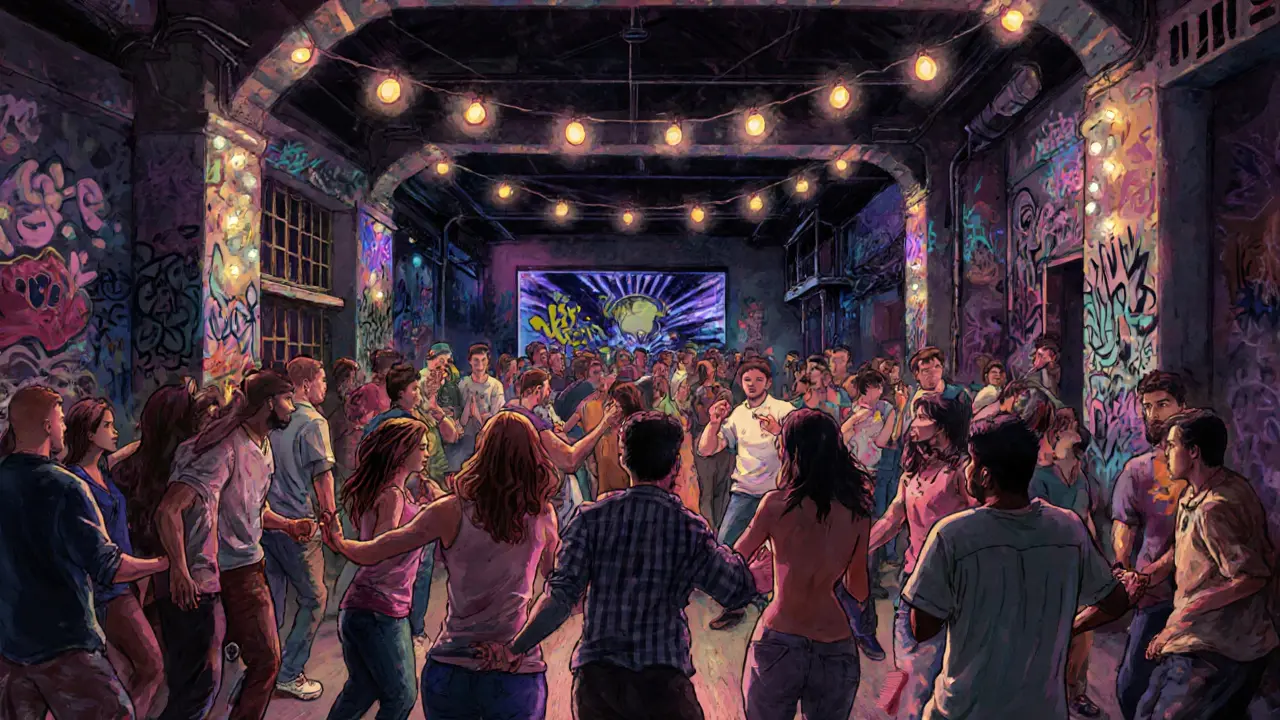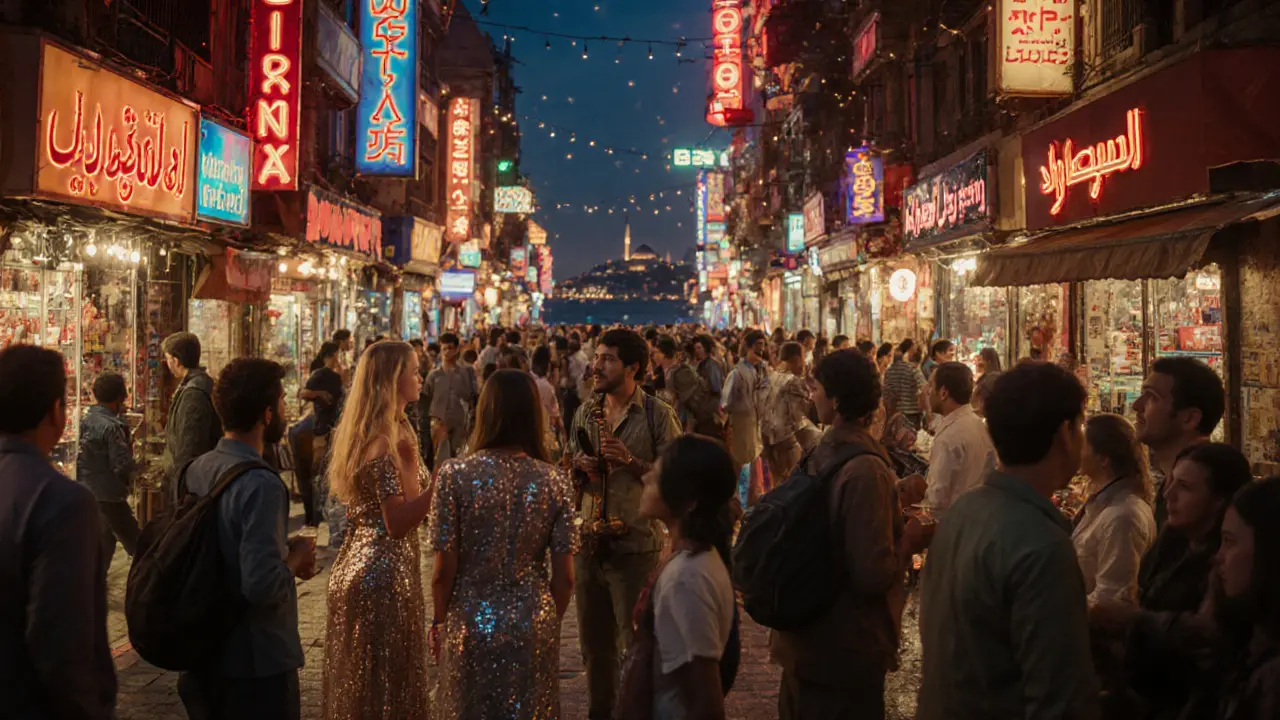When the sun sets over the Bosphorus, Istanbul doesn’t just light up-it transforms. The city’s nightlife isn’t just about drinking or dancing. It’s a living, breathing mix of cultures, identities, and sounds that have been shaping the streets of Beyoğlu, Kadıköy, and Karaköy for decades. You’ll find Turkish hip-hop spilling out of basement venues next to Syrian oud players in hidden courtyards, Russian expats sipping raki beside queer DJs spinning house music in converted warehouses, and elderly Istanbulis sipping tea on rooftop terraces while younger crowds dance below. This isn’t a tourist show. It’s real life, and it’s inclusive by necessity.
Where the Music Doesn’t Care Who You Are
In Istanbul, nightlife thrives because it’s one of the few places where people from different backgrounds can actually be themselves. Walk into Reina on a Friday night and you’ll see a crowd that looks like the United Nations: Turkish lesbians in sequins, German backpackers in sneakers, Iranian students in hoodies, and Nigerian DJs behind the decks. No one asks where you’re from. They just ask if you want another drink. This isn’t accidental. After the 2013 Gezi Park protests, underground venues became safe zones for marginalized groups. Queer collectives, feminist collectives, and migrant artist collectives started hosting events in abandoned factories and rooftop gardens. Today, places like Bar 23 in Beyoğlu and Uzun Masa in Kadıköy have become pilgrimage sites for anyone who’s ever felt like an outsider. The music changes every night-sometimes it’s techno, sometimes it’s bağlama fused with electronic beats-but the vibe stays the same: no judgment, just movement.Food That Feels Like Home, No Matter Where You’re From
Nightlife in Istanbul isn’t just about clubs. It’s about late-night eats that feel like comfort. After midnight, the streets of İstiklal Avenue turn into a food carnival. You can grab a warm simit from a street vendor, then walk five steps to a Kurdish-owned kebab joint where the owner remembers your name. Or you can slip into a tiny basement restaurant in Karaköy where a trans chef from Aleppo serves lamb stew with pomegranate molasses-just like her grandmother made. These aren’t fancy restaurants. They’re places where the staff knows your order before you speak. Where a Syrian refugee who lost his family in 2015 now runs a coffee stall that serves cardamom latte to university students and retired sailors alike. Where a group of trans women from Turkey and Iraq share a table every Friday, laughing over grilled eggplant and stories of survival. This is the real heartbeat of Istanbul’s night.
Quiet Corners for the Overwhelmed
Not everyone wants to dance until dawn. Istanbul understands that. In the same district where a club blasts bass at 2 a.m., you’ll find a quiet bookshop with dim lights and a single record player spinning jazz. İstanbul Kitaplığı in Cihangir opens until 3 a.m. on weekends. You can read poetry in Turkish, Arabic, or English. You can sit alone or join a circle of strangers who’ve come to read aloud. No one pressures you to speak. No one asks why you’re there. There’s also Yeni Kafe in Beşiktaş, where the owner doesn’t serve alcohol. Instead, she serves herbal teas, homemade baklava, and space. People come here after a long night out to decompress. Students, sex workers, retired teachers, and refugees all sit at the same wooden tables. No one is turned away. No one is asked for ID. This is the quiet rebellion of Istanbul’s night.The Rules Are Simple: Be Kind, Don’t Be a Jerk
You won’t find bouncers checking IDs at most underground spots. But you will find rules written in invisible ink: Don’t touch people without asking. Don’t make assumptions about someone’s gender. Don’t take photos. Don’t bring your ego. These aren’t posted signs. They’re understood. I’ve seen people get asked to leave a club for yelling at a drag performer. I’ve seen a group of tourists get politely but firmly told to stop taking selfies of a trans woman dancing alone. In Istanbul, respect isn’t enforced by security-it’s enforced by the crowd. And the crowd? They’re tired of being treated like a spectacle. They’ve spent years fighting to have their space. They won’t let strangers ruin it.
Why This Matters Beyond Istanbul
In a world where nightlife is increasingly corporate, sanitized, and exclusionary, Istanbul’s scene is a rare exception. While cities like Berlin and New York are losing their underground clubs to rent hikes and gentrification, Istanbul’s scene is growing-not because of funding or marketing, but because people refuse to let it die. It’s not perfect. There are still police raids. There are still hate crimes. But the community keeps showing up. Every Friday, a group of queer youth gathers in a secret garden in Üsküdar to dance under string lights. Every Saturday, a Syrian refugee band plays at a rooftop bar in Kadıköy, and the crowd sings along in three languages. Every Sunday, a feminist collective hosts a silent disco where the music is only heard through headphones-so no one can complain about the noise. This isn’t tourism. It’s resistance. It’s survival. And it’s beautiful.What to Do If You’re Visiting
If you’re planning to experience Istanbul’s nightlife, here’s how to do it right:- Start in Beyoğlu. Walk down İstiklal Avenue after 10 p.m. Let yourself get lost.
- Try Reina for big-name DJs, but go early. The line forms fast.
- Find Bar 23 or Uzun Masa if you want local energy, not tourist energy.
- Visit İstanbul Kitaplığı or Yeni Kafe if you need a quiet moment.
- Don’t ask people about their gender, religion, or origin unless they bring it up.
- Tip generously. Many workers here are undocumented or LGBTQ+ and rely on cash.
- Leave your camera at home unless you’re asked to take a photo.
And if you’re ever unsure? Just smile. Say “Merhaba”. And let the night guide you.
Is Istanbul’s nightlife safe for LGBTQ+ travelers?
Yes, but with awareness. While many venues are welcoming and actively queer-friendly, public displays of affection can still draw unwanted attention. Stick to known spots like Bar 23, Uzun Masa, or Reina, where the community has built trust. Avoid walking alone late at night in unfamiliar areas. Local LGBTQ+ groups often post updates on Instagram-follow them for real-time safety tips.
Are there any clubs that don’t allow foreigners?
No legitimate clubs in Istanbul turn people away based on nationality. Some underground spots may feel exclusive because they’re small and word-of-mouth only, but that’s about space, not exclusion. If someone tells you you’re not allowed in because you’re not Turkish, they’re either misinformed or trying to scare you off. The real gatekeepers are the crowd-not the bouncer.
What’s the best time to go out in Istanbul?
Istanbul doesn’t sleep early. Most bars open around 9 p.m., but the real energy starts after midnight. Clubs hit their peak between 1 a.m. and 4 a.m. If you want to dance, aim for Friday or Saturday. For quieter, more intimate experiences, try Wednesday or Thursday nights-locals call them "the real nights." Sunday mornings are for tea and quiet reflection.
Can I find vegan or halal-friendly food late at night?
Absolutely. In Kadıköy, Sevgi Döner serves vegan döner after midnight. In Beyoğlu, Yeni Çiğdem has halal vegetarian mezes that stay open until 3 a.m. Even the street vendors know how to adjust-just ask. Many places now label their menus, but if in doubt, say “vegan mı?” or “et yok, sadece sebze?” (no meat, just vegetables?).
Is it okay to take photos in clubs or bars?
Only if you’re asked. Many people in Istanbul’s nightlife scene are undocumented, queer, or from marginalized groups. Taking photos without permission can put them at risk. Even if someone looks like they’re posing, don’t assume it’s okay. A simple “May I take a photo?” goes a long way. If they hesitate, respect it. The best memories aren’t the ones you post-they’re the ones you feel.

